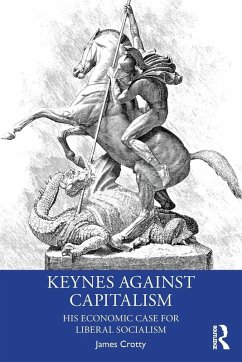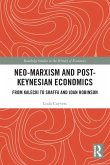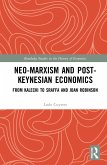Keynes is one of the most important and influential economists who ever lived. It is almost universally believed that Keynes wrote his magnum opus, The General Theory of Employment, Interest and Money, to save capitalism from the socialist, communist, and fascist forces that were rising up during the Great Depression era. This book argues that this was not the case with respect to socialism.
Tracing the evolution of Keynes's views on policy from WWI until his death in 1946, Crotty argues that virtually all post-WWII "Keynesian" economists misinterpreted crucial parts of Keynes's economic theory, misunderstood many of his policy views, and failed to realize that his overarching political objective was not to save British capitalism, but rather to replace it with Liberal Socialism. This book shows how Keynes's Liberal Socialism began to take shape in his mind in the mid-1920s, evolved into a more concrete institutional form over the next decade or so, and was laid out indetail in his work on postwar economic planning at Britain's Treasury during WWII. Finally, it explains how The General Theory provided the rigorous economic theoretical foundation needed to support his case against capitalism in support of Liberal Socialism.
Offering an original and highly informative exposition of Keynes's work, this book should be of great interest to teachers and students of economics. It should also appeal to a general audience interested in the role the most important economist of the 20th century played in developing the case against capitalism and in support of Liberal Socialism. Keynes Against Capitalism is especially relevant in the context of today's global economic and political crises.
Tracing the evolution of Keynes's views on policy from WWI until his death in 1946, Crotty argues that virtually all post-WWII "Keynesian" economists misinterpreted crucial parts of Keynes's economic theory, misunderstood many of his policy views, and failed to realize that his overarching political objective was not to save British capitalism, but rather to replace it with Liberal Socialism. This book shows how Keynes's Liberal Socialism began to take shape in his mind in the mid-1920s, evolved into a more concrete institutional form over the next decade or so, and was laid out indetail in his work on postwar economic planning at Britain's Treasury during WWII. Finally, it explains how The General Theory provided the rigorous economic theoretical foundation needed to support his case against capitalism in support of Liberal Socialism.
Offering an original and highly informative exposition of Keynes's work, this book should be of great interest to teachers and students of economics. It should also appeal to a general audience interested in the role the most important economist of the 20th century played in developing the case against capitalism and in support of Liberal Socialism. Keynes Against Capitalism is especially relevant in the context of today's global economic and political crises.
"A huge value of the book is that it differentiates the messages of Keynes's original work from modern-day "Keynesians." Crotty shows that the IS-LM incarnation of Keynes captured very little of Keynes's beliefs and left out the most important parts of his thought...There is hope that the macroeconomics discipline might finally be catching on to Keynes's relentless insistence that the assumptions of any model must be applicable to the real-world." Amanda Page-Hoongrajok, Phenomenal World blog
"This book is a marvel of economic narrative, with Crotty's clarity and Keynes's elegance in stunning counterpoint, from Versailles through the Depression to the war and Bretton Woods, all bringing forth the great, neglected fact that Keynes's Liberal Socialism was far more radical than modern memory would have us think.", James K. Galbraith, Lloyd M. Bentsen, Jr. Chair in Government/Business Relations, University of Texas at Austin
"James Crotty's writings have always been marked by deep thought and analysis, independence of mind, a judicious amalgamation of theory and empirical evidence and humane and realistic policies. The present volume is characterised by all these traits, it is vintage Crotty. The author makes a convincing case that Keynes since The Economic Consequences of Peace (1919) has been developing his ideas on liberal socialism that highlight the centrality of planning and public investment in sustaining full employment, ideas that came to full maturity in The General Theory and Keynes's writings and activities after its publication, in World War II and up to his death in April 1946. Crotty's arguments undermine the conventional wisdom of Keynesians and non-Keynesians alike that Keynes's aim was to save capitalism from itself and should be required reading for professional economists of all persuasions, policy makers, and concerned citizens appalled by the economic and political malaise we currently find ourselves in.", Geoffrey Harcourt, Emeritus Reader in The History of Economic Theory, Cambridge, Honorary Professor UNSW, Sydney
"This bold and brilliant work revolutionizes our understanding of Keynes' economics. Instead of reopening the often-debated topic of the essential characteristics of 'Keynesian economics,' James Crotty puts Keynes' lectures and writings into the context of both the economists and politicians with whom he interacted and of his political and policy engagements. Focusing on the moving pulse of Keynes' ideas from 1919 through his death in 1946, the author traces the evolution of his profound and extensive vision: achieving a sustainable future for capitalism cannot be left to market forces, but must be managed through public investment and of socialist planning and coordination. This book's provocative approach is perfectly timed for broad rethinking of macroeconomics that is now underway. In the density and originality of its themes, and in the integrity and depth of its scholarship, the reader is left in little doubt that this is the work of a master.", Gary A. Dymski, Professor of Applied Economics, Leeds University Business School, University of Leeds
"Regardless of whether you share Crotty's revisionist framing of Keynes' overarching vision, this smart, erudite and illuminating book is steeped in the enduring wisdom of its subject, and shines a powerful light on the fundamental differences between the economics of Keynes and practice of postwar "Keynesianism" - a distinction of pressing relevance for today's economic challenges.", Jonathan David Kirshner, Stephen and Barbara Friedman Professor of International Political Economy, Department of Government, Cornell University
"James Crotty has written an outstanding description of the evolution of Keynes's thought on the role of State involvement in a capitalism that promotes full employment and fairness. Characterisations of Keynesian economics by policy-makers and academics runs far afield from the clarity of purpose that Keynes held when describing the working of a capitalist economy. Crotty, in this clear and well written book, has surely set the record straight.", Professor Roy Rotheim, Skidmore College, USA
"This book is a marvel of economic narrative, with Crotty's clarity and Keynes's elegance in stunning counterpoint, from Versailles through the Depression to the war and Bretton Woods, all bringing forth the great, neglected fact that Keynes's Liberal Socialism was far more radical than modern memory would have us think.", James K. Galbraith, Lloyd M. Bentsen, Jr. Chair in Government/Business Relations, University of Texas at Austin
"James Crotty's writings have always been marked by deep thought and analysis, independence of mind, a judicious amalgamation of theory and empirical evidence and humane and realistic policies. The present volume is characterised by all these traits, it is vintage Crotty. The author makes a convincing case that Keynes since The Economic Consequences of Peace (1919) has been developing his ideas on liberal socialism that highlight the centrality of planning and public investment in sustaining full employment, ideas that came to full maturity in The General Theory and Keynes's writings and activities after its publication, in World War II and up to his death in April 1946. Crotty's arguments undermine the conventional wisdom of Keynesians and non-Keynesians alike that Keynes's aim was to save capitalism from itself and should be required reading for professional economists of all persuasions, policy makers, and concerned citizens appalled by the economic and political malaise we currently find ourselves in.", Geoffrey Harcourt, Emeritus Reader in The History of Economic Theory, Cambridge, Honorary Professor UNSW, Sydney
"This bold and brilliant work revolutionizes our understanding of Keynes' economics. Instead of reopening the often-debated topic of the essential characteristics of 'Keynesian economics,' James Crotty puts Keynes' lectures and writings into the context of both the economists and politicians with whom he interacted and of his political and policy engagements. Focusing on the moving pulse of Keynes' ideas from 1919 through his death in 1946, the author traces the evolution of his profound and extensive vision: achieving a sustainable future for capitalism cannot be left to market forces, but must be managed through public investment and of socialist planning and coordination. This book's provocative approach is perfectly timed for broad rethinking of macroeconomics that is now underway. In the density and originality of its themes, and in the integrity and depth of its scholarship, the reader is left in little doubt that this is the work of a master.", Gary A. Dymski, Professor of Applied Economics, Leeds University Business School, University of Leeds
"Regardless of whether you share Crotty's revisionist framing of Keynes' overarching vision, this smart, erudite and illuminating book is steeped in the enduring wisdom of its subject, and shines a powerful light on the fundamental differences between the economics of Keynes and practice of postwar "Keynesianism" - a distinction of pressing relevance for today's economic challenges.", Jonathan David Kirshner, Stephen and Barbara Friedman Professor of International Political Economy, Department of Government, Cornell University
"James Crotty has written an outstanding description of the evolution of Keynes's thought on the role of State involvement in a capitalism that promotes full employment and fairness. Characterisations of Keynesian economics by policy-makers and academics runs far afield from the clarity of purpose that Keynes held when describing the working of a capitalist economy. Crotty, in this clear and well written book, has surely set the record straight.", Professor Roy Rotheim, Skidmore College, USA








